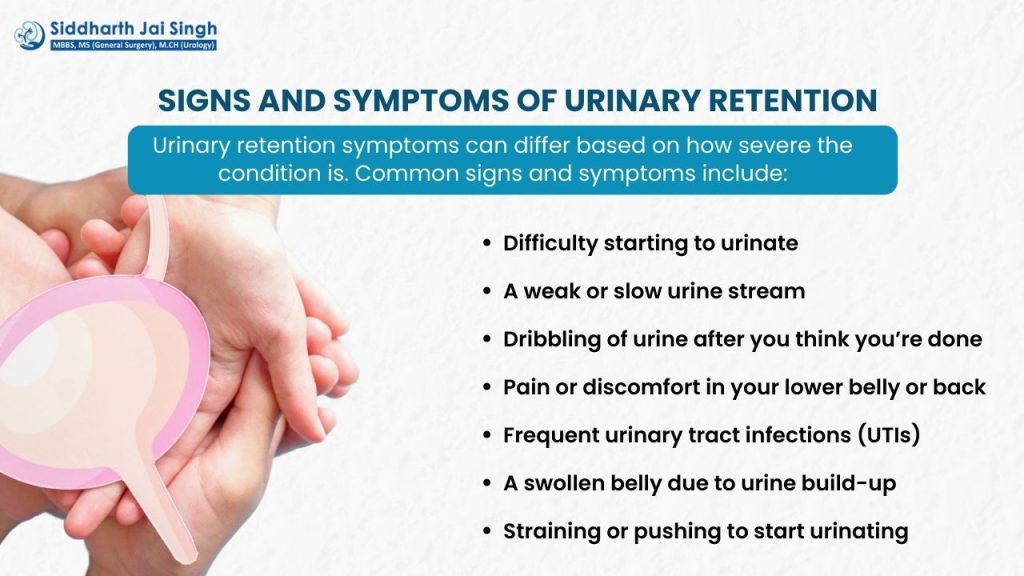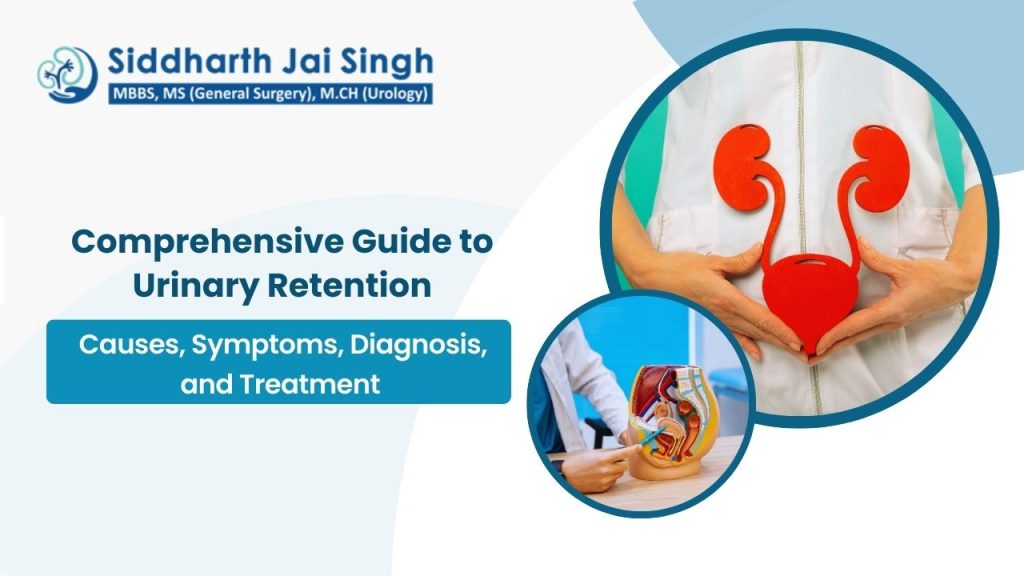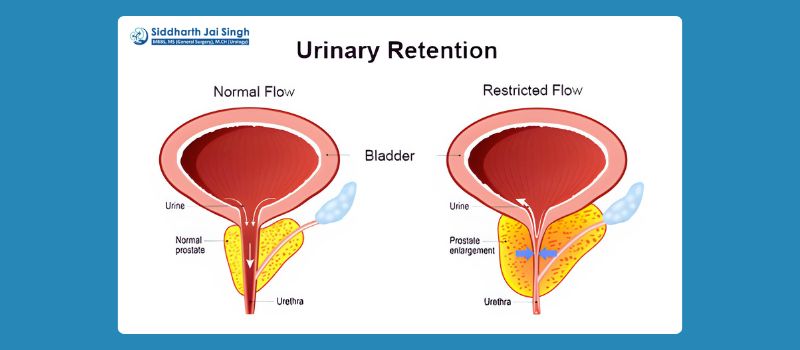Urinary retention is a condition where a person is unable to empty their bladder completely, or in some cases, at all. This condition can occur suddenly (acute urinary retention) or develop gradually (chronic urinary retention). Understanding the causes, symptoms, diagnosis, and treatment of urinary retention is essential for managing this condition effectively. Below, we explore all about urinary retention and the role of doctors in diagnosing and treating this condition.
What is Urinary Retention?
Urinary retention refers to the inability to fully or partially empty the bladder. This condition can cause discomfort, pain, and in severe cases, become a medical emergency. There are two primary types of urinary retention:
Acute Urinary Retention: A sudden, severe inability to urinate, often accompanied by intense pain and discomfort. This is a medical emergency requiring immediate attention.
Chronic Urinary Retention: Develops gradually, characterized by a slow loss of bladder function, leading to incomplete bladder emptying. Though it may not cause significant pain, it can lead to serious complications if untreated.
Causes of Urinary Retention
Urinary retention can be caused by a variety of factors, including obstructions, infections, nerve problems, medications, and more.
- Obstruction: One of the most common causes of urinary retention is a blockage in the urinary tract, which can prevent urine from flowing freely. Obstructions can occur due to:
- Enlarged Prostate (BPH): In men, benign prostatic hyperplasia (BPH) is a leading cause of urinary retention. The enlarged prostate presses against the urethra, restricting urine flow.
- Urethral Stricture: A narrowing of the urethra due to scar tissue can obstruct urine flow.
- Kidney Stones: Stones can block the urethra or bladder, causing retention.
- Tumors: Growths in the bladder, prostate, or urethra can lead to obstruction and retention.
2. Infections: Infections in the urinary tract, such as urinary tract infections (UTIs), can cause inflammation and swelling, leading to temporary retention. Prostatitis, an infection of the prostate gland, can also cause retention in men
3. Nerve Problems: Nerve signals play a crucial role in the functioning of the bladder. Nerve problems can disrupt these signals, leading to retention. Causes include:
- Spinal Cord Injury: Damage to the spinal cord can interfere with the signals between the brain and bladder.
- Multiple Sclerosis: This autoimmune disease can affect the nerves controlling bladder function.
- Diabetes: High blood sugar levels can damage the nerves, leading to retention.
4. Medications: Certain medications can interfere with bladder function, leading to retention. These include:
- Antihistamines: Often used to treat allergies, they can cause the bladder muscles to relax too much.
- Antidepressants: Some antidepressants can interfere with nerve signals to the bladder.
- Decongestants: These can tighten the muscles around the bladder neck, making it difficult to urinate.
5. Surgery: Post-operative urinary retention is a common complication, especially after surgeries involving the pelvis, hips, or spine. Anesthesia and certain pain medications can temporarily impair bladder function.
6. Other Causes: Conditions such as severe constipation, which can compress the urethra, or pelvic organ prolapse in women, can also lead to urinary retention.

Symptoms of Urinary Retention
The symptoms of urinary retention can vary depending on whether the condition is acute or chronic.
- Acute Urinary Retention:
- Inability to Urinate: The most obvious symptom is the sudden and complete inability to urinate despite having a full bladder.
- Severe Pain: Intense discomfort or pain in the lower abdomen or pelvic region due to the full bladder.
- Swelling: The lower abdomen may appear swollen due to the retention of urine.
- Chronic Urinary Retention:
- Frequent Urination: A need to urinate frequently, often in small amounts.
- Difficulty Starting Urination: Difficulty in initiating the flow of urine, even with the urge to urinate.
- Weak Urine Stream: A weak or interrupted urine stream.
- Feeling of Incomplete Emptying: A sensation that the bladder is not fully empty after urination.
- Discomfort: Mild discomfort or pressure in the lower abdomen.
Diagnosis of Urinary Retention
Diagnosing urinary retention involves a combination of medical history, physical examination, and diagnostic tests. Doctors will typically follow these steps:
- Medical History: The doctor will ask about your symptoms, medical history, and any medications you are taking. They may also inquire about recent surgeries or injuries that could affect bladder function.
- Physical Examination: A physical examination will be performed to check for any obvious signs of retention, such as a swollen bladder. In men, a digital rectal exam (DRE) may be conducted to assess the prostate.
- Bladder Scan: A bladder ultrasound (or bladder scan) is a non-invasive test that measures the amount of urine remaining in the bladder after urination. It helps determine the extent of retention.
- Urinalysis: A urine sample may be tested to check for infections, blood, or other abnormalities that could be causing retention.
- Post-Void Residual (PVR) Test: This test measures the amount of urine left in the bladder after urination using ultrasound or catheterization. A high PVR indicates incomplete bladder emptying.
- Cystoscopy: In some cases, a cystoscopy may be performed to examine the inside of the bladder and urethra. This involves inserting a thin tube with a camera into the bladder through the urethra.
- Urodynamic Tests: These tests assess how well the bladder and urethra store and release urine. They help identify the underlying cause of retention, such as bladder muscle weakness or nerve problems.
Treatment of Urinary Retention
Treatment for urinary retention depends on the underlying cause and the severity of the condition. Treatment options include:
- Catheterization: In acute urinary retention, immediate relief is often provided by inserting a catheter into the bladder to drain the urine. This may be a temporary solution until the underlying cause is treated.
- Medications: Depending on the cause, medications may be prescribed to improve bladder function:
- Alpha-Blockers: These medications relax the muscles around the bladder neck and urethra, making it easier to urinate.
- Antibiotics: If an infection is causing retention, antibiotics may be prescribed.
- 5-Alpha-Reductase Inhibitors: For men with an enlarged prostate, these medications can reduce the size of the prostate over time.
- Surgical Treatment: Surgery may be necessary if other treatments are ineffective or if there is a physical obstruction:
- Prostate Surgery: In men with BPH, surgery may be performed to remove part of the prostate and relieve the obstruction.
- Urethral Dilation: This procedure widens the urethra if it is narrowed by a stricture.
- Bladder Surgery: In some cases, surgery may be needed to remove tumors or correct structural abnormalities.
- Bladder Training and Pelvic Floor Exercises: For chronic urinary retention, bladder training and pelvic floor exercises may be recommended to improve bladder control and reduce symptoms.
- Intermittent Self-Catheterization: In cases of chronic retention, patients may be taught to perform self-catheterization intermittently to empty the bladder regularly.
- Treatment of Underlying Conditions: Managing underlying conditions, such as diabetes or nerve disorders, can help reduce the symptoms of urinary retention.
When to Consult with a Urologist?
If you’re experiencing symptoms of urinary retention, don’t wait to seek medical help. This condition can range from being a minor inconvenience to a serious medical emergency, especially in cases of acute urinary retention, which requires immediate attention. Chronic urinary retention should also be evaluated by a doctor to prevent complications like urinary tract infections, bladder damage, or even kidney failure.
When it comes to diagnosing and treating urinary retention, Dr. Siddharth Jai Singh is the specialist you need. As a Best urologist in Siliguri and Bhagalpur, he provides personalized treatment plans tailored to the root cause of your condition, ensuring that you receive the best possible care. With his expertise, you can regain control over your bladder function and significantly improve your quality of life.

Dr. Siddharth Jai Singh
Consultant Uro-surgeon in Siliguri
MBBBS, MS (General Surgery), MCh (Urology)
Consultant Urologist, Andrologist, Laparoscopic and Renal Transplant Surgeon
Call For Appointment +91 97094 44999
Don’t let urinary retention go untreated. Early consultation with Dr. Siddharth Jai Singh can make all the difference in preventing serious complications and helping you get back to living comfortably. Take the first step toward better bladder health by booking an appointment today.


